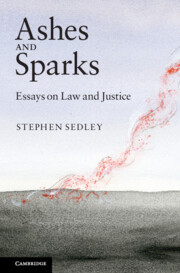Book contents
- Frontmatter
- Contents
- Preface
- Acknowledgements
- PART I History
- PART II Law
- 12 Justice miscarried
- 13 Breaking the law
- 14 Declining the brief
- 15 Big lawyers and little lawyers
- 16 Parliament, government, courts
- 17 Judges in lodgings
- 18 Mice peeping out of oakum
- 19 Justice in Chile
- 20 Never do anything for the first time
- 21 Rarely pure and never simple
- 22 Law and plumbing
- 23 The Laws of Documents
- PART III Justice
- Index
19 - Justice in Chile
Published online by Cambridge University Press: 05 June 2012
- Frontmatter
- Contents
- Preface
- Acknowledgements
- PART I History
- PART II Law
- 12 Justice miscarried
- 13 Breaking the law
- 14 Declining the brief
- 15 Big lawyers and little lawyers
- 16 Parliament, government, courts
- 17 Judges in lodgings
- 18 Mice peeping out of oakum
- 19 Justice in Chile
- 20 Never do anything for the first time
- 21 Rarely pure and never simple
- 22 Law and plumbing
- 23 The Laws of Documents
- PART III Justice
- Index
Summary
Towards the end of 2003 my wife, Tia, and I went to Chile. In January 2004, while I attended a constitutional law conference, Tia went riding in the Andes: her account, which accompanied mine, also appears here.
Before that we had stayed for a week with Juan and Inès Guzmán. In London the year before I had met Juan, like me a judge of his country's court of appeal, unlike me a national hero. He had been next on the rota to act as examining magistrate, as required by the constitution, when a criminal information was laid against a public figure. The information he drew was a charge of crimes against humanity laid against General Pinochet the day after the general stepped down from presidential office. It changed Juan's life; it also changed Chile's life. This Diary piece from the London Review of Books in June 2004 records a little of what had been happening since he was thrust into unsought limelight.
In a crowded restaurant a bottle of wine arrives at our table with a note: ‘Por tratar de juzgar a Pinochet y hacer justicia en nuestro pais’ – ‘For your efforts to bring Pinochet to trial and to do justice in our country.’
Wherever we go in Chile with him, people recognise Juan Guzmán as the judge who has indicted a series of high-ranking officers for the torture, murder and aggravated kidnapping of more than a hundred victims of the military terror of the 1970s and 1980s.
- Type
- Chapter
- Information
- Ashes and SparksEssays On Law and Justice, pp. 192 - 199Publisher: Cambridge University PressPrint publication year: 2011



